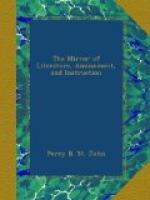* * * * *
THE TRUE GENTLEMAN.
By a gentleman, we mean not to draw a line that would be invidious between high and low, rank and subordination, riches and poverty. The distinction is in the mind. Whoever is open, loyal, and true; whoever is of humane and affable demeanour; whoever is honourable in himself, and in his judgment of others, and requires no law but his word to make him fulfil an engagement—such a man is a gentleman: and such a man may be found among the tillers of the earth. But high birth and distinction, for the most part, insure the high sentiment which is denied to poverty and the lower professions. It is hence, and hence only, that the great claim their superiority; and hence, what has been so beautifully said of honour, the law of kings, is no more than true:—
It aids and strengthens virtue where it
meets her,
And imitates her actions where she is
not.
De Vere.
* * * * *
ROYAL PLANTERS.
Among the earliest and most successful planters was Count Maurice, of Nassau, who flourished in the seventeenth century. This prince had the advantage of operating in the genial clime, and with the fruitful soil of Brazil, of which in the year 1636, he was governor. He was a man of taste and elegance, and adorned his palaces and gardens in that country with a magnificence worthy of the satraps of the east. His residence was upon an island formed by the confluence of two rivers, a place which before he commenced his improvements presented no very promising subject, being a dreary, waste, and uncultivated plain, equally worthless and unattractive. On this spot, however, he erected a splendid palace, laid out gardens around it of extraordinary




